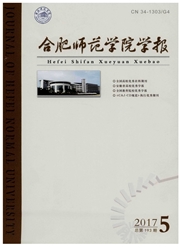

 中文摘要:
中文摘要:
汉语史上"好、喜、爱"均经历过从"喜爱"义能愿动词到"容易(发生)"义情态副词或"经常(发生)"义频率副词的语义演变和语法化、主观化过程。其共同的语法化条件是带谓词性短语作宾语、主语对宾语控制的衰减以及主宾语语义范围的扩展,语义基础是主语对于宾语具有积极意愿,语义演变机制主要是转喻和推理。
 英文摘要:
英文摘要:
hao,xi and ai have all undergone changes from verbs to adverbs in the history of Chinese,during which their meanings shifted from "to like;be fond of"to "be likely to"or "often".They underwent grammaticalization and subjectification under the following identical conditions:the presence of a predicate phrase serving as an object,attenuation in the degree of control exerted by subjects on objects,and extension of semantic types of subjects and objects.The positive intention of the subject towards the object forms the semantic starting point for all three,with monotony and inference constituting the main mechanisms of semantic change involved.
 同期刊论文项目
同期刊论文项目
 同项目期刊论文
同项目期刊论文
 期刊信息
期刊信息
